Riddles have been used as teaching tools and brain teasers across cultures for centuries. Though often dismissed as silly wordplay, riddles provide meaningful cognitive stimulation across all ages. Solving riddles exercises our critical thinking, expands perspectives, and strengthens social bonds. While riddles entertain, they also impart important developmental benefits that can last a lifetime.
The Cognitive Boost of Riddles
Riddles are, at their core, complex puzzles that require deductive reasoning, flexibility of thought, and quick problem-solving skills to unravel. Unlike trivia questions that rely on memorized facts, riddles force us to think in new ways to find solutions. The mental effort involved in deciphering riddles provides the brain intensive exercise.
Solving riddles activates regions of the brain associated with critical thinking, language processing, and working memory. Riddle-solving requires holding information in your head while manipulating it to unpack the puzzle, strengthening short-term memory. The “aha!” moment when the riddle’s meaning clicks provides instant gratification and a rush of dopamine, reinforcing learning. With continued riddle practice, these cognitive skills are honed over time.
Studies suggest that exposing children to wordplay, including riddles, appears to accelerate language development. The playfulness of riddles creates excitement around words, increasing vocabulary. Attempting to solve verbal puzzles helps children connect words with deeper meanings.
Beyond language, regularly tackling riddles may improve children’s abstract and divergent thinking abilities. Riddles require identifying key details while disregarding irrelevant information to find the answer. This analytical thinking style strengthens problem-solving and reasoning skills. The boost in cognitive function from riddles can translate to better academic performance.
Even into adulthood, engaging with riddles provides continued cognitive exercise to build mental acuity. Challenging yourself to solve witty word puzzles may help sharpen focus, improve memory retention, and delay age-related cognitive decline.
Riddles as Educational Tools for Children
Riddles have served as educational tools to nurture children’s imaginative thinking for generations. Riddles provide a playful way for kids to build the reasoning skills necessary for success in school and life.
Preschool aged children enjoy simple riddles with rhyming and exaggerated humor that hint at an obvious answer. Practicing these riddles helps develop phonetic awareness and vocabulary. For early readers, following along with the verbal puzzle of a riddle helps connect sounds with words on the page.
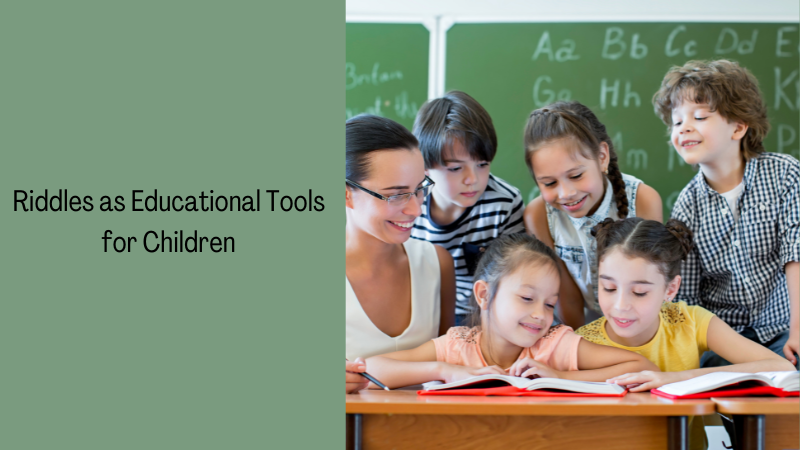
As children’s cognition advances in elementary school, they can comprehend more complex riddle structures, including longer setups with wordplay teasers. Teachers use narrative riddles to reinforce literary elements such as foreshadowing, metaphor, and personification. Classroom riddle breaks provide academic variety while cultivating critical thinking.
Tweens and teens thrive on brain teasers with multiple answer layers and clever misdirection. Applying different thinking strategies to solve multifaceted riddles strengthens deductive reasoning, an asset for math and science concepts. Riddles keep curious pre-teen minds engaged, while also fostering creativity and confidence.
With guidance, caregivers can use riddles tailored to their child’s level as opportunities to nurture language, reading comprehension, reasoning abilities, listening skills, and imagination. Playful riddle solving lays a foundation for scholastic achievement through cognitive stimulation.
The Role of Critical Thinking and Deductive Reasoning
At their core, riddles are complex questions that require unraveling logical connections. Solving riddles involves deductive reasoning skills – using available information to arrive at a specific solution. We analyze riddle clues and eliminate possible but illogical answers to identify the intended meaning.
This process activates critical thinking by challenging us to evaluate key details that may reveal the riddle’s secret meaning. Riddles stretch our thinking in provocative ways that defy initial assumptions. Identifying the subtle wordplay and ironic twists in riddles requires imagination to see beyond the expected.
Repeated practice with deductive reasoning strengthens mental reflexes, allowing quicker analysis and filtering of extraneous details. Speed in unraveling riddles indicates improvement in cognitive flexibility and problem-solving skills. Deductive reasoning aptitude translates to better judgment calls in real life situations.
Riddles also build mindfulness around language and its nuances. Appreciating how diction, syntax, and double entendres function in riddles increases meta-cognition. This awareness aids reading comprehension and discernment. Critical thinking fortified by riddles becomes an invaluable, lifelong skill.
Riddles in Early Childhood Development and Education
Riddles have served an important role in early childhood development and education for generations. Solving age-appropriate riddles provides young children cognitive stretching in a fun, engaging format during key developmental windows.
Between ages 2-4, simple riddles help toddlers and preschoolers make connections between words, sounds, meanings, and associations. Rhyming riddles reinforce phonetic patterns, expanding vocabulary. This fortifies pre-reading skills such as rhyme recognition.
At ages 5-7, riddles allow grade school children to play with language and reasoning. Following riddle narratives strengthens listening skills and introduces story structure. Solving novel riddles expands perspective and creativity.
Riddles improve concentration, an asset for academic success. When stumped by a riddle, kids utilize metacognition to think through the puzzle, developing critical analysis abilities.
Incorporating riddles into lessons adds an interactive element to increase student engagement. Riddles lay a foundation in literary techniques and logical thinking that provides benefits across subject mastery.
Age-Appropriate Riddles for All Ages
Part of the delight of riddles is that they evolve in complexity and nuance across our lifespan. Age-appropriate riddles tailored to a child’s cognitive level and interests maximize enjoyment and developmental benefits.
Ages 2-4 benefit from riddles with simple language and obvious rhyming patterns:
- I’m tall when I’m young and short when I’m old. What am I? A candle.
Ages 5-7 can follow longer riddle narratives and wordplay:
- The more you take away, the larger I become. What am I? A hole.
Ages 8-12 thrive on riddles with double meanings to unpack:
- What gets wetter the more it dries? A towel.
Teens relish challenging riddles with metaphors and layered meanings:
- I have cities but no houses, forests but no trees, and water but no fish. What am I? A map.
While kids love stumping their parents, adults can turn the tables with sophisticated riddles to engage teens:
- What occurs once in a minute, twice in a moment, but never in one thousand years? The letter M.
As adults, we continue enjoying riddles that require wit and wisdom to solve:
- What always ends everything? The letter G.
Riddles provide fun cognitive exercise across generations. Adjusting riddle difficulty and subject matter to match maturing thinking skills ensures riddles remain engaging and educational.
Encouraging Problem-Solving with Riddles
Riddles are inherently fun puzzles that require creative problem-solving abilities. The challenges of deciphering a riddle’s hidden meanings encourages the development of problem-solving skills.
Solving a new riddle involves:
- Careful listening and analysis of clues
- Eliminating unlikely solutions
- Trying out various interpretations
- Arriving at non-obvious solutions
This process strengthens skills in inductive reasoning, pattern recognition, strategic thinking, and mental flexibility. With practice, these skills improve efficiency in identifying connections between riddle elements that reveal the solution.
Riddles also foster habits of persistence and resilience. Initially puzzling over a riddle can be frustrating. Yet repeatedly mulling over its clues and possible interpretations teaches perseverance that leads to the “aha!” breakthrough moment. Solving riddles builds confidence in tackling tricky problems.
Enjoying riddles as mental challenges encourages the mindset of playful inquisitiveness. Riddles develop capacities for investigation and discovery that aid real-world problem-solving. Learning to unravel riddles empowers logical thinking to overcome cognitive obstacles.
Riddles Build Intergenerational Bonds
Part of the enduring appeal of riddles is that they provide an entertaining and meaningful activity for interaction between children and adults. Riddles create opportunities for modeling and transferring critical thinking skills across generations.
Exchanging riddles allows children and grandparents to playfully engage with each other’s intellect. Kids feel a sense of achievement when they can stump elder family members with a clever riddle. In turn, experienced adults provide a wise sounding board to help children unpack thorny riddles.
The two-way exchange builds respect between generations while forging patience and listening skills. Cooperative riddle solving becomes quality time together filled with learning, laughter, and deepening family bonds.
In classrooms, teachers who regularly exchange riddles with students gain lively engagement. Riddles allow teachers to act as academic guides, facilitating critical thinking growth through interactive challenges.
Making riddles part of intergenerational activities provides cognitive stimulation while also strengthening relationships and solidarity across age groups. Riddles create connections through shared mirth and mental gymnastics.
Lifelong Benefits of Riddles
The joy and cognitive benefits of riddles are lifelong. As our reasoning skills deepen with age, riddles provide continuing challenges that exercise the brain’s flexibility, analysis, and logic functions.
Puzzling over riddles’ metaphorical twists, ironic innuendos, and clever wordplay keeps aging minds nimble. Attempting to solve riddles may help counter cognitive decline by activating new neural pathways and reinforcing connections.
In addition to mental calisthenics, riddles provide opportunities for amusement and bonding. Riddle exchanges break the ice between strangers and ignite friendly competition. The open-ended nature of riddles invites speculation and dialogue.
Beyond mental exercise, unraveling riddles provides feelings of satisfaction, achievement, and connection. Riddles delight all ages by rewarding intellect with surprise, insight, and laughter.
Though often dismissed as trivial, riddles develop critical thinking abilities that benefit learners throughout life. Parents can foster children’s potential by nurturing joy and skill in solving riddles. Between generations, exchanging age-appropriate riddles builds cognitive skills while creating shared understanding. For old and young alike, riddles challenge us to find wisdom in wit.
Frequently Asked Questions About Riddles
Are some people just better at solving riddles than others?
Certainly some individuals excel at riddles more than others. However, the ability to solve riddles relies on skills that can be developed with practice over time, rather than fixed innate aptitude. Trying lots of different riddles exercises cognitive flexibility, deduction, and verbal comprehension to improve proficiency.
Are riddles only for children?
Not at all! While children enjoy age-appropriate riddles, the mental challenge is stimulating at any age. Riddles continue honing critical thinking skills even as adults. Different riddle types appeal across various life stages.
Do riddles really make kids smarter or just entertain them?
Well-constructed riddles do both! Riddles exercise the developing mind in children while also providing amusement. Following riddle narratives promotes focus and comprehension too. The combination of engagement and cognitive effort enhances learning.
If kids don’t solve a riddle quickly, should you just give them the answer?
Resist the urge to supply the solution too quickly. Allowing time to unravel a riddle’s complexity exercises cognitive persistence. If a riddle elicits frustration, provide gentle guidance toward the “aha” moment. The feeling of solving a brain teaser provides a sense of mastery and accomplishment.
Do riddles have any downsides?
Riddles are an overall positive tool, but those with hurtful stereotypes should be avoided. Choose riddles that spark insight rather than promote outdated biases. As brain training tools, even clever riddles should be balanced with real world learning applications.
Conclusion
Riddles often get dismissed as frivolous pastimes. Yet puzzling out riddles delivers meaningful cognitive benefits across our lifespans. Riddles exercise our deductive reasoning, spur imaginative connections, and provide feelings of satisfaction when solved.
Children thrive when given riddles tailored to expand their developing intellect. Tackling age-appropriate riddles helps young minds strengthen skills in concentration, logic, language, and metaphorical thinking. Shared riddles provide opportunities for modeling reasoning strategies.
For adults too, riddles supply continued cognitive calisthenics. Puzzling out perplexingverbal conundrums keeps aging minds flexible and engaged. Across generations, exchanging riddles forges bonds through cooperative problem-solving and laughter.
Riddles deserve recognition for their role in nourishing minds young and old. The essence of a riddle – prompting unconventional thinking to reveal truths – makes the form timeless. Riddles entertain and enlighten; their lasting cognitive gifts are worth celebrating and cultivating.

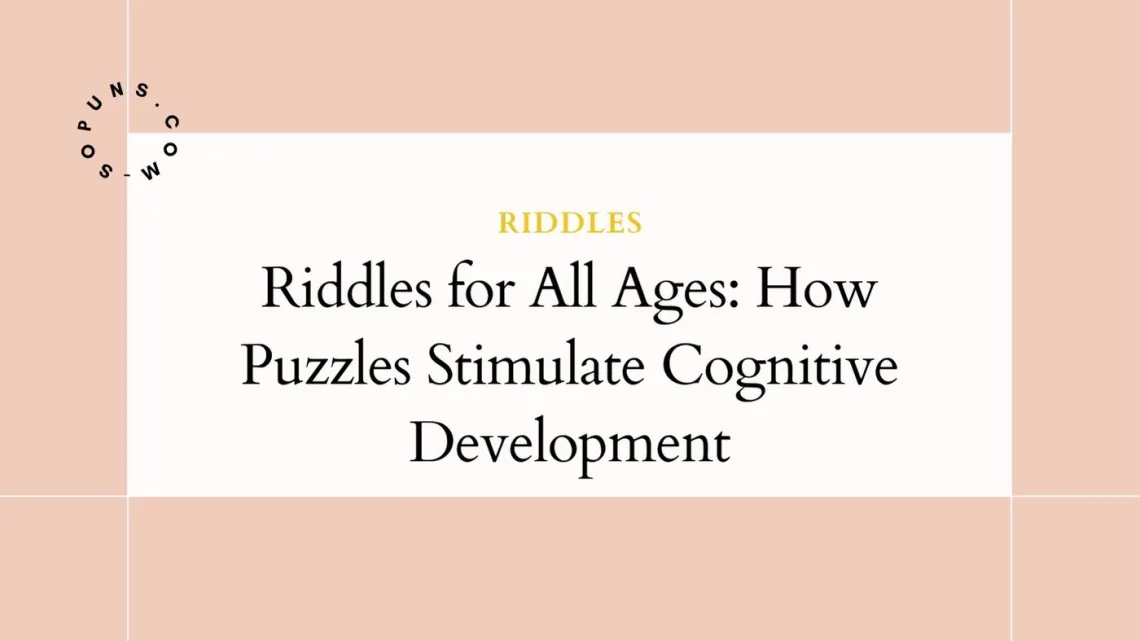
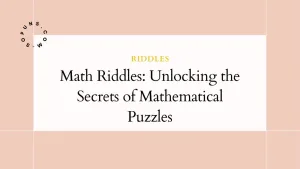
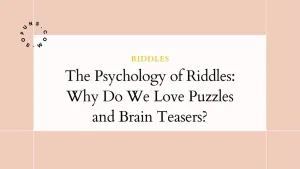
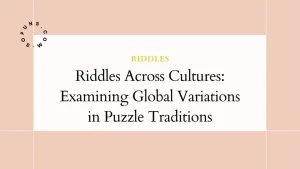

No Comments